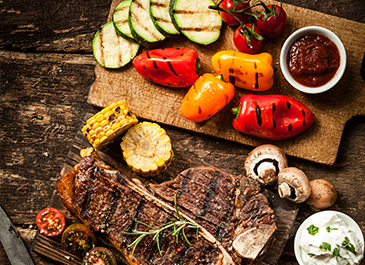During my second pregnancy, I had a craving for protein that I just couldn’t seem to satiate with legumes, eggs or even fish. The 9 pound 7ounce boy I was growing wanted meat, so after being vegetarian for 15 years—I bought my first organic chicken. My meat-eating husband almost fainted when he came home to a fried chicken dinner! Needless to say, I could no longer call myself a vegetarian. I needed a new term to define my food choices. A Sustainabilist Diet seemed to make the most sense. So here are the values I prioritize for my health as well as that of my family, food system, community and planet.
1. Eating Local
Where we live, it’s simple to support local producers of everything from produce to seafood to eggs. Doing so generates money for the BC economy, reduces food miles and keeps food production and farm as viable occupations for the future, ensuring the security of good food for generations to come. Prioritizing local foods also means eating more seasonally or, rather, skipping the fresh strawberries in January that definitely aren’t grown locally.
2. Eating Organic
Maintaining the health and integrity of our soil and habitats is a key facet of organic farming. This is often absent from conventional methods that favour short-term high yield crops with long-term consequence. Also in organic animal husbandry, animals go outside to graze on natural flora and fauna and they are not given hormones or antibiotics. Both of which improve the animals’ health and the quality of the protein.
3. Prioritizing Plant-Based
Although I still eat organic chicken, I can only afford it once a week for my family of four. Luckily the affordability of legumes offsets the greater expense of organic animal proteins. Legumes are not only the most affordable and sustainable protein source on the planet, but as crops they fix nitrogen into the soil. Even if it means simply starting with Meatless Monday, the more plant-based foods we can eat, the lower our carbon footprint and the lower our risk for heart disease, diabetes and cancer.
4. Fishing for Ocean Wise Seafood
I do my best to ensure the seafood I purchase is harvested in a sustainable manner. Why? For one, this limits bycatch, the amount of unwanted creatures that are unintentionally caught during a harvest then just discarded. It also prevents environmental degradation and depletion of wild stocks. Ocean Wise stickers on products make sustainable seafood options easy to spot.
5. Minimizing Food Waste—Canadians throw away $13 billion in food annually, which is not sustainable environmentally or economically. Understanding how to store food to delay spoilage and how to preserve or make use of all foods can make a huge difference in the amount of food going to garbage or compost. Another thing I’ve learned since buying my first organic chicken—buy the whole bird! It costs and wastes less and I save the bones to make stock.
Nicole was so excited by this new diet definition, she spearheaded a book on the subject. Becoming a Sustainabilist is a 100-page resource and recipe book available at Choices. It’s filled with facts and tips on how to eat as sustainably as you can. Find out more about living sustainably, at our cooking demos/seminars.

